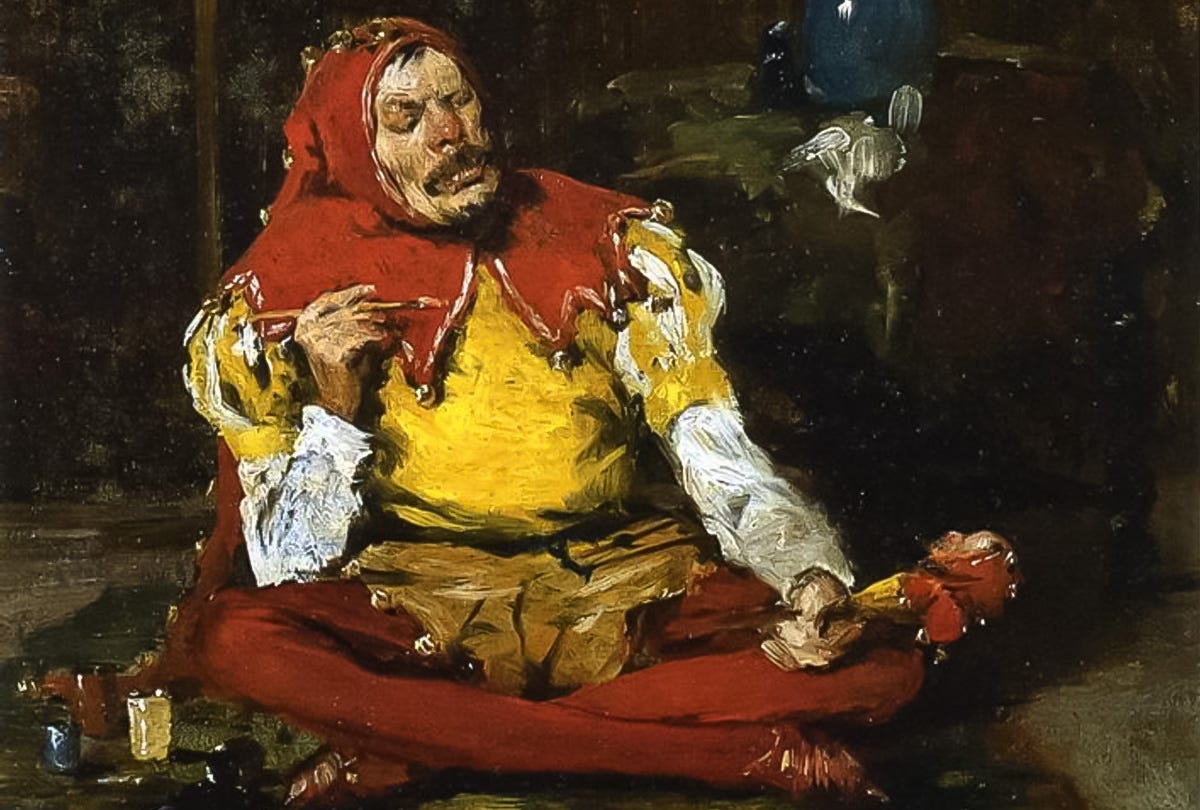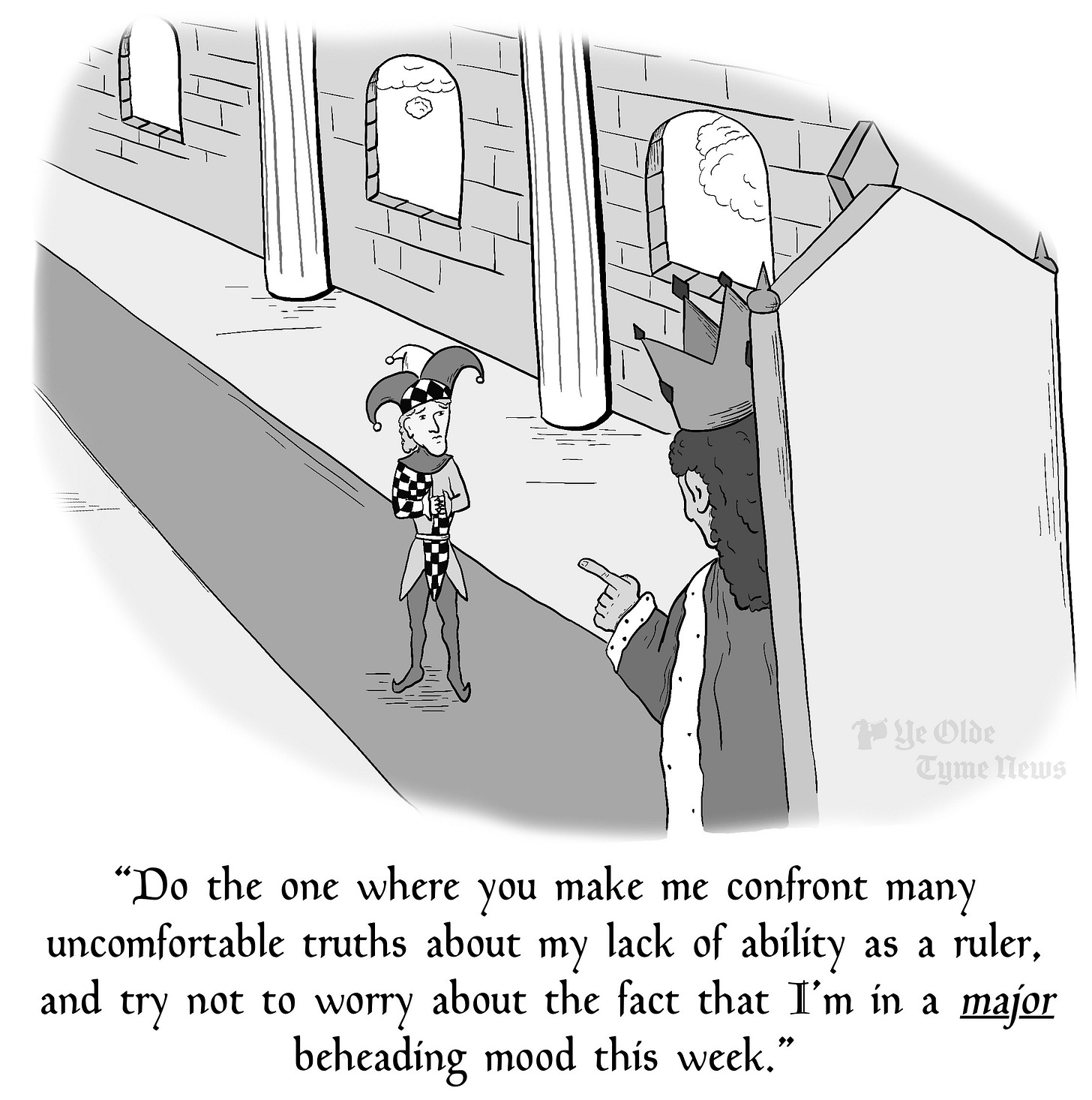Ye Opinion: Real Fools Don’t Celebrate April Fools’ Day. Real Fools Are Idiots All Year Round
Being a fool is a full tyme job
Dearest reader, Happy All Fools’ Day to thee and thy fellow morons! Today’s post also features an addendum on court jesters. So readest on and enjoy this most sacred of holidays!

By Royal Court Jester Smerald Blokestench
As a court jester, one might think I look forward to April Fools’ Day each year. One might think I enjoy this ignoble holiday which honours the contributions of fools of all stripes and checkers. But, frankly, April Fools’ Day disgusts me.
‘Tis not that fools don’t deserve to be honoured — we do. Nay, the problem is all the poseurs who think that pulling pranks but one day a year earns them the right to call themselves “fool.”
Such ignorance is laughable. (Note that one might consider laughable ignorance worthy of fooldom, so long as the laughable ignoramus is such 24-7-365.)
Being a fool is no holiday: ‘tis a full tyme job. ‘Tis a way of lyfe. Real fools don’t celebrate April Fools’ Day. Real fools are idiots all year round.
When I walk throughst the streets in May, or even June, I see not crowds of clowns and harlequins, but crowds of ordinary unfoolish people going about their ordinary unfoolish lives. Yet on April the First, every soul suddenly deems themself worthy to don the full Motley and a ridiculous foolscap and throw a meat pie in my face. If I laugh, ‘tis not on account of thy skill in jocularity, but out of pity on account of thy coarse naïveté. And also because laughing is the only way to bury the eternal emptiness that burns deep inside of me.1
If one dost desire to earn the title of “fool” or “court jester” or “dumb buffoon that The King physically and emotionally abuses for entertainment,” one hast to put in the work. A real fool has scars, both visible and invisible, from the day-to-day grind out on the court. A real fool seeks opportunities to make farting noises at the supper table each and every night, regardless of whether His Majesty is in a torturing-the-court-jester mood or not. A real fool cries himself to sleep every tyme one of his jokes doesn’t land and The King cuts off another finger.
So cometh not upon me on April Fools’ Day with thy japes and jests. For thou art not worthy of the title “fool.” And anyway, The King tortured me pretty bad yesterday so He gave me the day off.
Addendum: The Last Court Jester
Why, pray, of late do Europe’s kings
No jester in their courts admit?
They’ve grown such stately solemn things;
To bear a joke, they think not fit.
But though each court a jester lacks,
To laugh at monarchs to their face,
All mankind do behind their backs,
Supply the honest jester’s place.
Court jesters were by no means unique to medieval Europe. Equivalents existed from Africa to Japan, from India to the Americas. Montezuma, Emperor of the Aztecs in the early 16th century, is purported to have said that “more instruction was to be gathered from them than from wiser men, for they dared to tell the truth.”2
In England, which had many of the most famous court jesters, the practice is often considered to have ended in 1649, when King Charles I was beheaded and Oliver Cromwell is said to have outlawed the position of “State Jester.” The last official jester to the court of England was named Muckle John. While I couldn’t find any solid primary source on the practice being outlawed, The History of Court Fools by John Doran agrees that Muckle John was the last official court jester to the king of England. Here’s a list of Muckle John’s clothing items and prices from an account book of the period:
A long coat and suit of scarlet-colour serge for Muckle John, 10l. 10s. 6d.
One pair of crimson silk hose, and one pair of gaiters and roses for Muckle John, 61s.
For a pair of silk and silver garters, and roses and gloves suitable for Muckle John, 110s.
For a hat covered with scarlet, and a band suitable; and for two rich feathers, one red, the other white, for Muckle John, 50s.
Stags’-leather gloves, fringed with gold and silver.
A hat-band for Muckle John.
One pair of perfumed gloves, lined with sables, 5s.
While his king was beheaded, Muckle John was spared, and presumably got another job. Hopefully one that allowed him to wear perfumed gloves lined with sable.
But the practice didn’t really end with him. The role of official court fool to the king may have been eliminated, but the role of “house fool” lived on. Other English lords and ladies still employed jesters in their households for decades afterwards. The last recorded jester may have been an anonymous one employed at Hylton Castle in the early-to-mid-1700s. The last recorded joke of the last recorded jester is related in The History of Court Fools. The jester’s lord was returning from a trip and left his carriage behind at a ferry, so that he was forced to walk a long distance. As he at last approached his property, the jester, standing at the end of a bridge awaiting him, clad in a “gaily gold-embroidered dress,” quipped, “Who’s the fool now?”3

In 2004, after more than 350 years without an official state court jester, an organization called English Heritage (which manages Stonehenge, Hadrian’s Wall, and other historic sites) sought to revive the position. Twelve prospective fools auditioned, and they hired Nigel Roder, aka “Kester the Jester”, as England’s first State Jester in three-and-a-half centuries.
As people do, they had a problem with this. A group called the Guild of Jesters complained, saying the position was not advertised early enough for all jesters to have a fair shot at applying, and that English Heritage had no authority to bestow the title “State Jester.” English Heritage agreed to drop the title and to announce auditions earlier in ensuing years. There are currently no job postings for jesters on English Heritage’s jobs page, but I’ll keep an eye out for them. Their Facebook page has pictures of people dressed as knights and peasants and stuff, so I imagine they hire various medieval positions during raiding season.
More recently, the King of Tonga appointed an official court jester in 1999 in one of the more absurd stories of the early 2000s. Jesse Bogdonoff was a Bank of America financial advisor to the government of Tonga in the 1990s and early 2000s. In 1999, King Tāufaʻāhau Tupou IV issued a royal decree appointing him as court jester. Bogdonoff was later involved in a scandal and sued by Tonga after investing millions of dollars of the government’s money in a company that disappeared during the dot-com bubble. He later fled the country and changed his name for security reasons. It seems that he learned from the experience, and he now appears to be a fairly successful hypnotherapist in California.4
Also because ‘tis my job.
From John Doran, The History of Court Fools. Available on Project Gutenberg. This is also the source of the poem that begins this addendum.
Not exactly a knee-slapper.
I swear I’m not making this up. Allegedly, Bogdonoff was appointed court jester on…April 1st…which was also his birthday.






I’m a fool every day
I love this newsletter 😂